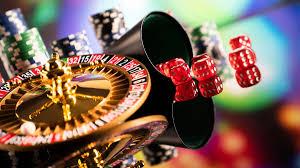Casino gambling is often seen as a form of entertainment, offering excitement, social interaction, and the thrill of winning money. However, gambling is more than just a pastime; it is closely linked to risk-taking behavior. Understanding this connection can help both casual and serious gamblers make more informed decisions and recognize when their behavior might become problematic.
Why Gambling Attracts Risk-Takers
At its core, casino gambling is a game of uncertainty. Every bet placed carries the possibility of winning or losing, which naturally appeals to individuals who enjoy taking risks. People who are more inclined toward risk-taking often seek out experiences that trigger adrenaline and excitement, and gambling provides that rush in a controlled environment. From high-stakes poker to spinning the roulette wheel, every casino game is designed to engage the player’s sense of uncertainty and reward.
Studies have shown that individuals who engage in risk-taking behavior may have differences in brain chemistry. The release of dopamine, a neurotransmitter associated with pleasure and reward, is higher in risk-takers when they experience uncertainty and anticipation. Casino gambling leverages this biological response, making the experience highly stimulating and sometimes addictive.
The Psychology Behind Risk-Taking in Gambling
Casino gambling allows people to experience risk in a structured environment, which can provide a sense of thrill without real-world consequences—at least initially. Risk-takers often underestimate the odds of losing and overestimate the chances of winning, leading them to make larger bets or take more chances than the average person.
Moreover, the design of casino games—bright lights, celebratory sounds, and frequent small wins—encourages repeated risk-taking. Slot machines, for example, give players near-miss results, which psychologically feel like almost-winning experiences. This nudges players to continue gambling, hoping for the big win, even when the probability of success is low.
Risk-Taking Behavior and Gambling Addiction
While taking risks can be an enjoyable part of gambling, it can also lead to problematic behavior. People with a high tendency for risk-taking may find themselves chasing losses, gambling longer than intended, or spending beyond their means. Over time, this can escalate into gambling addiction, affecting relationships, finances, and mental health.
Recognizing the link between risk-taking and gambling is crucial for prevention. Gamblers need to be aware of their personal tendencies and set limits on time and money spent. Tools like self-exclusion programs, gambling apps, or resources such as Link Resmi Casino Online can provide guidance and safe environments for those seeking to enjoy gambling responsibly.
Managing Risk-Taking While Gambling
Here are some practical steps to balance risk-taking and responsible gambling:
-
Set a Budget: Determine a fixed amount of money to spend and stick to it, regardless of wins or losses.
-
Understand the Odds: Knowledge of game probabilities helps players make more informed decisions.
-
Take Breaks: Regular breaks reduce the likelihood of impulsive bets and fatigue-driven decisions.
-
Track Behavior: Keeping a journal of gambling habits helps identify patterns of risk-taking and potential issues.
-
Seek Support: If gambling starts affecting daily life, support groups and professional counseling are available.
Casino gambling and risk-taking behavior are closely connected. While risk-taking adds excitement and appeal to gambling, it also carries potential pitfalls if left unchecked. By understanding this link and practicing responsible habits, gamblers can enjoy the thrill of the casino without compromising their well-being. Awareness, limits, and proper resources like Link Resmi Casino Online can ensure gambling remains a fun and controlled activity rather than a dangerous risk.



